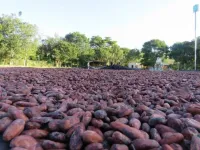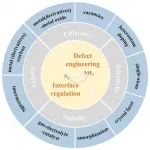(Press-News.org) NEW YORK, NY (June 28, 2021)--In the first analysis of its kind, researchers at Columbia University Vagelos College of Physicians and Surgeons and several other institutions have linked distinct patterns of genetic mutations with obsessive-compulsive disorder (OCD) in humans.
The work, published online June 28 in Nature Neuroscience, confirms the validity of targeting specific genes to develop new OCD treatments and points toward novel avenues for studying this often debilitating condition.
OCD, which affects 1% to 2% of the population, often runs in families and genes are known to play a large role in determining who develops the disease. However, the identity of many OCD genes remains unknown.
"Many neurological diseases are influenced by strongly acting mutations which can cause disease by themselves," says David Goldstein, PhD, director of the Institute for Genomic Medicine at Columbia and a senior author on the new paper. "These mutations are individually very rare but important to find because they can provide a starting point for the development of therapeutics that target precise underlying causes of disease."
Although strongly acting mutations have been hypothesized to exist in OCD, statistically reliable evidence has been difficult to obtain.
Most previous studies on the genetics of OCD have used a "candidate gene" approach, in which researchers focus on plausible genes that might be involved in pathogenesis and look for genetic signatures of risk. Although that approach has had some successes, it can lead to challenges in statistical interpretation and can miss unexpected genes. As a result, both funding agencies and the pharmaceutical industry increasingly focus on genome-wide analyses that can securely implicate genes in disease risk.
"The solution to the problem is to study all the genes in the genome at the same time and ask whether any of them have significant evidence of influencing risk. That had not been done yet at scale in OCD," says Goldstein.
In collaboration with Gerald Nestadt, MBBCh, a psychiatrist at Johns Hopkins University with access to a cohort of OCD patients, Goldstein's team took this genome wide approach, which uses high-throughput sequencing and computational biology techniques to identify relevant genes anywhere in the genome.
The investigators looked at genes that encode protein using whole exome sequencing in more than 1,300 OCD patients and compared them to similarly large control groups. The multi-institution collaboration also included scientists from the University of North Carolina at Chapel Hill, the David Geffen School of Medicine in Los Angeles, Harvard Medical School, and SUNY Downstate Medical Center in Brooklyn.
The analysis showed a strong correlation between OCD and rare mutations, particularly in a gene called SLITRK5 that had been previously linked to OCD in candidate-gene studies.
Goldstein expects that the new data on SLITRK5 will encourage pharmaceutical companies and translational researchers to develop drugs that target this gene.
The study also identified a specific pattern of variation in other genes. "When you look at genes that do not tolerate variation in the human population, those are the genes most likely to cause disease, and with OCD, we see an overall increased burden of damaging mutations in those genes compared to controls," Goldstein says. "That's telling us that there are more OCD genes to be found and where to find them."
For patients suffering from OCD and their doctors, new treatments can't come too soon. OCD causes uncontrollable, recurring thought patterns and behaviors that interfere with patients' daily lives.
"OCD is a disabling disorder that is twice as common as schizophrenia," says H. Blair Simpson, MD, PhD, professor of psychiatry at Columbia University Vagelos College of Physicians and Surgeons and director of the Center for OCD & Related Disorders at New York State Psychiatric Institute, who was not involved with the new study.
Two available treatments, serotonin reuptake inhibiting drugs and cognitive-behavioral therapy, are highly effective, Simpson adds, but only work on about half of patients. "Thus, these genetic findings are very exciting; they indicate that the promise of precision medicine could include OCD, ultimately transforming how we diagnose and treat this disorder."
INFORMATION:
More Information
The paper is titled "Exome sequencing in obsessive-compulsive disorder reveals a burden of rare damaging coding variants."
All authors: Mathew Halvorsen (University of North Caroline at Chapel Hill), Jack Samuels (Johns Hopkins University), Ying Wang (Johns Hopkins), Benjamin D. Greenberg (Brown Medical School), Abby J. Fyer (Columbia), James T. McCracken (David Geffen School of Medicine at UCLA), Daniel A. Geller (Harvard Medical School and Massachusetts General Hospital), James A. Knowles (SUNY Downstate Health Sciences University), Anthony W. Zoghbi (Columbia), Tess D. Pottinger (Columbia), Marco A. Grados (Johns Hopkins), Mark A. Riddle (Johns Hopkins), O. Joseph Bienvenu (Johns Hopkins), Paul S. Nestadt (Johns Hopkins), Janice Krasnow (Johns Hopkins), Fernando S. Goes (Johns Hopkins), Brion Maher (Johns Hopkins), Gerald Nestadt (Johns Hopkins), and David B. Goldstein (Columbia).
This work was supported by the National Institutes of Health (grants MH099216, MH097971, MH097993). Data acquisition was made possible by the OCD Collaborative Genetics Association Study, funded by the National Institute of Mental Health (grants MH071507, MH079489, MH079487, MH079494, and MH071507).
David Goldstein reports equity holdings in precision medicine companies and consultancy payments from Gilead Sciences, AstraZeneca, and GoldFinch Bio. Other authors declare no competing financial interests.
Columbia University Irving Medical Center provides international leadership in basic, preclinical, and clinical research; medical and health sciences education; and patient care. The medical center trains future leaders and includes the dedicated work of many physicians, scientists, public health professionals, dentists, and nurses at the Vagelos College of Physicians and Surgeons, the Mailman School of Public Health, the College of Dental Medicine, the School of Nursing, the biomedical departments of the Graduate School of Arts and Sciences, and allied research centers and institutions. Columbia University Irving Medical Center is home to the largest medical research enterprise in New York City and State and one of the largest faculty medical practices in the Northeast. For more information, visit cuimc.columbia.edu or columbiadoctors.org.
Slow earthquakes are long-period earthquakes that are not so dangerous alone, but are able to trigger more destructive earthquakes. Their origins lie in tectonic plate boundaries where one plate subsides below another. Though the causal mechanism is already known, there has been a lack of data to accurately model the life cycle of slow earthquakes. For the first time, researchers use deep-sea boreholes to gauge pressures far below the seafloor. They hope data from this and future observations can aid the understanding of earthquake evolution.
The surface of the Earth lies upon gargantuan ...
New York, NY--June 28, 2021--Predicting what someone is about to do next based on their body language comes naturally to humans but not so for computers. When we meet another person, they might greet us with a hello, handshake, or even a fist bump. We may not know which gesture will be used, but we can read the situation and respond appropriately.
In a new study, Columbia Engineering researchers unveil a computer vision technique for giving machines a more intuitive sense for what will happen next by leveraging higher-level associations between people, animals, and objects.
"Our algorithm is a step toward machines being able to make better predictions about human behavior, and ...
Sixteen of the 146 health-related All-Party Parliamentary Groups (APPGs) in the Houses of Parliament (UK) received over a £1 million in payments from 35 pharmaceutical companies between 2012-2018 according to a new study.
The researchers behind the analysis from the University of Bath's Centre for the Analysis of Social Policy suggest their findings reveal a worrying lack of transparency over payments received and potential conflicts of interests towards public policy.
Through their research they extracted details from 6,624 entries about funding ...
Experts estimate more than 6 million Americans are living with Alzheimer's dementia. But a recent study, led by the University of Cincinnati, sheds new light on the disease and a highly debated new drug therapy.
The UC-led study, conducted in collaboration with the Karolinska Institute in Sweden, claims that the treatment of Alzheimer's disease might lie in normalizing the levels of a specific brain protein called amyloid-beta peptide. This protein is needed in its original, soluble form to keep the brain healthy, but sometimes it hardens into "brain stones" or clumps, called amyloid plaques.
The study, which appears in the journal EClinicalMedicine (published by the Lancet), comes on the heels of the FDA's conditional approval of a new medicine, aducanumab, that ...
CORVALLIS, Ore. - Oregon State University researchers have some good news for the well-meaning masses who place bird feeders in their yards: The small songbirds who visit the feeders seem unlikely to develop an unhealthy reliance on them.
"There's still much we don't know about how intentional feeding might induce changes in wild bird populations, but our study suggests that putting out food for small birds in winter will not lead to an increased dependence on human-provided food," said Jim Rivers, an animal ecologist with the OSU College of Forestry.
Findings from the research, which looked at black-capped chickadees outfitted with radio frequency identification tags, ...
New York, NY (June 28, 2021) - Patients with a type of blood cancer called multiple myeloma had a widely variable response to COVID-19 vaccines--in some cases, no detectable response--pointing to the need for antibody testing and precautions for these patients after vaccination, according to a study that will be published in Cancer Cell this week.
Mount Sinai researchers found that multiple myeloma patients mount variable and sometimes suboptimal responses after receiving the Pfizer-BioNTech or Moderna COVID-19 vaccines. Almost 16 percent of these patients developed no detectible antibodies after both vaccine doses. These findings may be relevant to other cancer patients undergoing treatment and to immunocompromised patients.
"This study ...
Did you know chocolate comes from cocoa beans grown in some of the most biodiverse tropical landscapes on the planet? The cocoa tree (Theobroma cacao) is farmed within biodiversity hotspots of West Africa, South America, and Southeast Asia. Cocoa was traditionally grown under a canopy of native trees that provided habitat for birds and other wildlife. However, pressure to increase cocoa production has pushed many farmers to clear forest and eliminate the shade trees on their farms.
An estimated 2-3 million hectares of tropical forest were converted to cocoa from 1988-2008 with severe consequences for biodiversity. Unsustainable cocoa monocultures (agricultural ...
Multi-business firms have flexibility advantages over single-business rivals because they have the option to redeploy resources across businesses. This flexibility, it has been assumed without empirical evidence, is purported to inspire quicker exits from markets.
A 2017 survey revealed that 70 percent of corporate executives expected to make at least one divestment in the subsequent two years, with the primary motive being strategic realignment of portfolios as non-core assets are shed. A large number of academic studies have established that parent firms tend ...
Imagine having feelings of distress and negativity at some point as you are going about your day. Then imagine feeling that way every day, for almost 21 days. Lesbian, gay, bisexual, transgender and queer youth don't have to imagine having negative feelings at some point throughout the day for an extended period of days. A new study from American University reveals just how pervasive emotional distress is related to stigma around sexual orientation.
"Although we know that LGBTQ youth experience bullying, discrimination, and microaggressions during adolescence, we don't know how prevalent these experiences ...
The electrochemical nitrogen reduction reaction (e-NRR) under ambient conditions is an emerging strategy to tackle the hydrogen- and energy-intensive processes entailed in industrial ammonia (NH3) synthesis via the traditional Haber-Bosch process. However, the e-NRR performance is currently impeded by the inherent inertness of N2 molecules, extremely slow kinetics, and overwhelming competition from the hydrogen evolution reaction (HER), all of which result in an unsatisfactory yield and ammonia selectivity (Faradaic efficiency, FE). To achieve a high-selectivity and high-performance NRR under ambient conditions, the rational design of efficient electrocatalysts is urgently required. Defect and interface engineering ...




